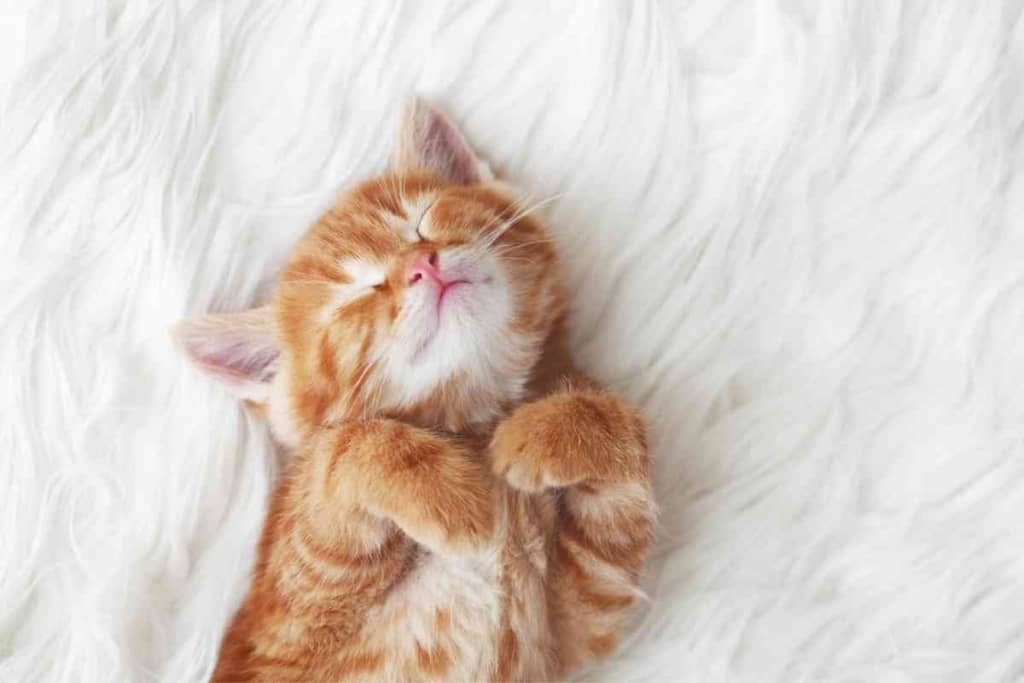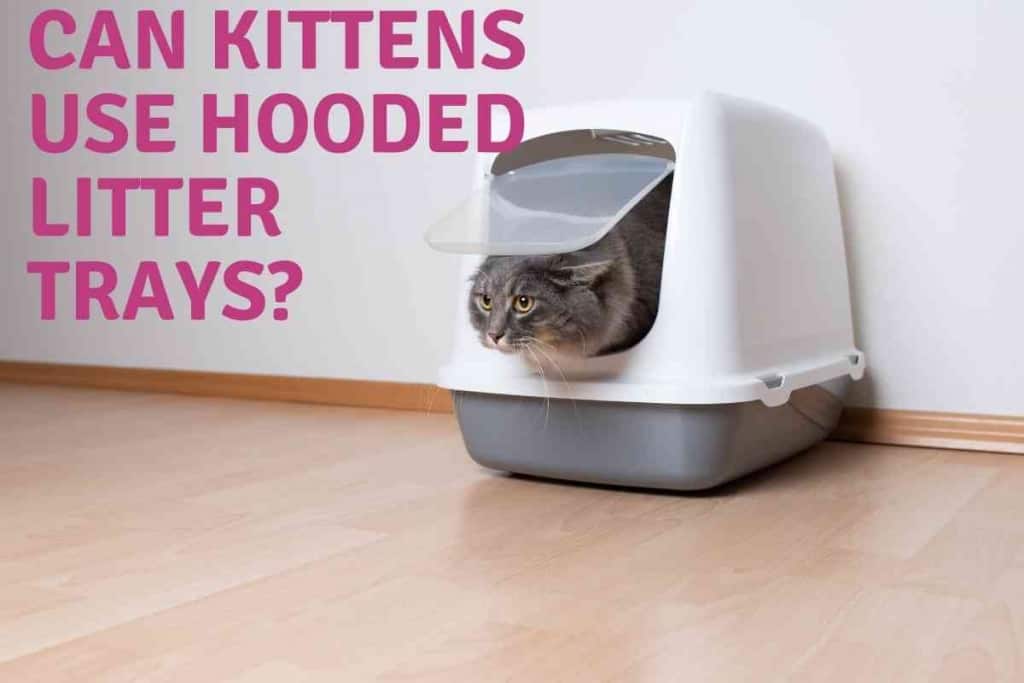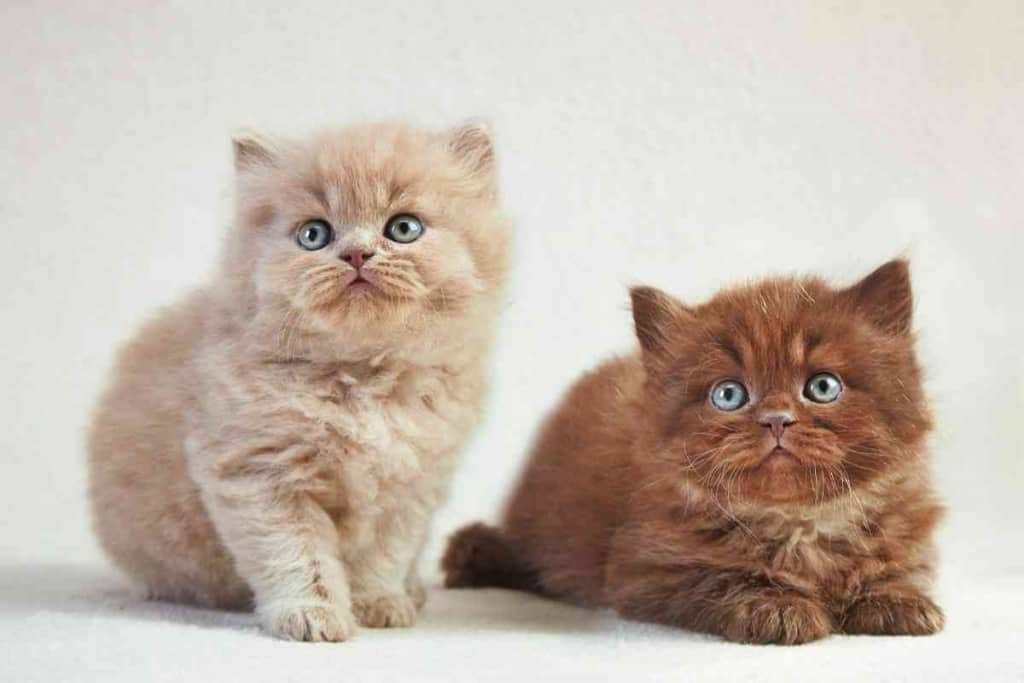cat swollen lip? (Do This NOW!)
Is your cat’s chin or lip swollen? This can be due to many different reasons. Sometimes this will quickly disappear, but this could be an early sign that your cat has something more going on. There are a few things that you can try at home at first, but if your cat’s lip does not quickly improve, it would be best for your cat to see your vet.
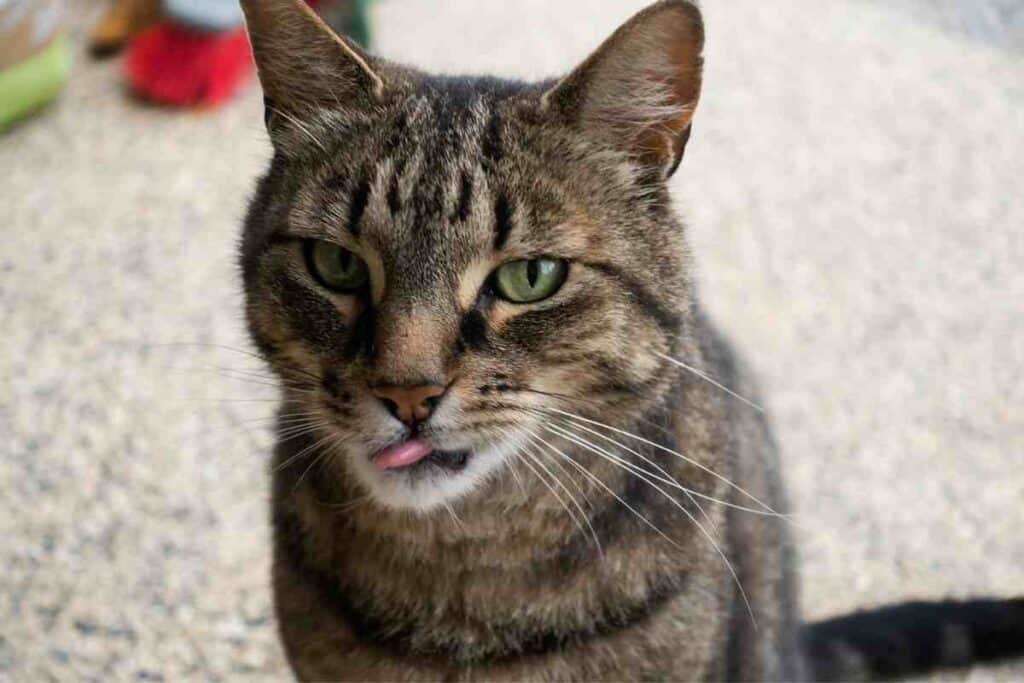
Why is my Cat’s Lip Swollen?
- Eosinophilic Granuloma Complex
- Skin Cancer
- Chin Acne
- Dental Issues
- Allergies
- Bug Bites
You love your cat and spend your days obsessing over things like whether you’re seeing a symptom of an allergic reaction after every mosquito bite or when your kitten should lose their baby fur. Naturally, if you suddenly see a big swollen lower lip, you’re going to be worried. Don’t rush to the emergency veterinarian right away.
These are a few common reasons that your cat’s skin around the lip may be swollen. Some of these will go away after a day or two, but many will stay around for a long time. Sometimes a cat’s swollen lips is a sign of something serious like oral tumors. Other times a feline acne or ingrown hairs or hair follicles that have ingrown are causing the problem.
If the problem does not just go away the next day or seems to be getting worse, it would be best for your vet to see them see why their lip is swollen. They can put your cat under anesthesia and use tools like radiographs and allergy testing to rule out possible causes.
Home remedies are unlikely to be effective for treating oral tumors or skin cancer, so seek out your vet.
6 Common Reasons that Your Cat’s Lip Maybe Swollen
These are 6 common reasons that can cause a cat’s lip to get swollen
Eosinophilic Granuloma Complex
Eosinophilic Granuloma is also called a rodent ulcer. This causes your cat’s lip to be very swollen and ulcerated.
While the cause of this disease is unknown, it is believed to be caused by allergies, autoimmune diseases, feline leukemia, fleas, bacterial or fungal infections.
Your vet can easily diagnose this condition in your cat. This can be treated depending on what is causing this in your cat.
Common things needed to help treat Eosinophilic Granuloma Complex are:
- Flea and tick prevention
- Limited ingredient diets
- Antibiotics
- Anti-inflammatories
While these can look very bad, they usually are benign causes of lip swelling that your vet can help you treat and control.
Skin Cancer
Cats can get cancer on their face and lips. This is commonly seen in white or light-faced cats. You may notice that their lip is swollen because they have cancer.
This would also be ulcerated and have a very hard time trying to heal.
Common types of skin cancer seen on cat’s face are:
- Squamous Cell Carcinoma
- Melanoma
- Mast Cell Tumors
If your cat has a swollen or ulcerated lip, your vet may want to take a small sample from this area to see if there are cancer cells present.
If your cat does have cancer on their face or lips, there are chemotherapy and radiation options for your cat. Many of these will have to be done at a veterinary specialty center with a veterinary oncologist.
Even if you don’t want to treat the underlying cause, it’s worth finding a proper diagnosis since an oral tumor and the infected pocket of bacterial infections and infected tissue that can result can be very painful. There may be only a small surgery involved in making your cat comfortable again.
Chin Acne
Cats can commonly get acne on their chin that extends to their bottom lip. You will see black and red spots on their chin. Your cat may even be rubbing their face causing it to be raw and infected.
There are many causes of chin acne in cats, such as:
- Allergies
- Unclean food and water bowls
- Ingrown chin hairs
- Bacterial and fungal infections
If your cat has chin acne, you can try washing their face every day with a gentle shampoo or even using a baby wipe to help keep this area clean. Infected hair follicles can also be at fault when a cat’s lip is swollen. Cat owners often panic about a cat’s lip swelling, when really the cat’s health is fine.
Also, switching types of bowls your cat is using. Plastic bowls tend to cause cats to develop chin acne more frequently than glass or ceramic bowls, so dedicated cat lovers avoid using a plastic bowl.
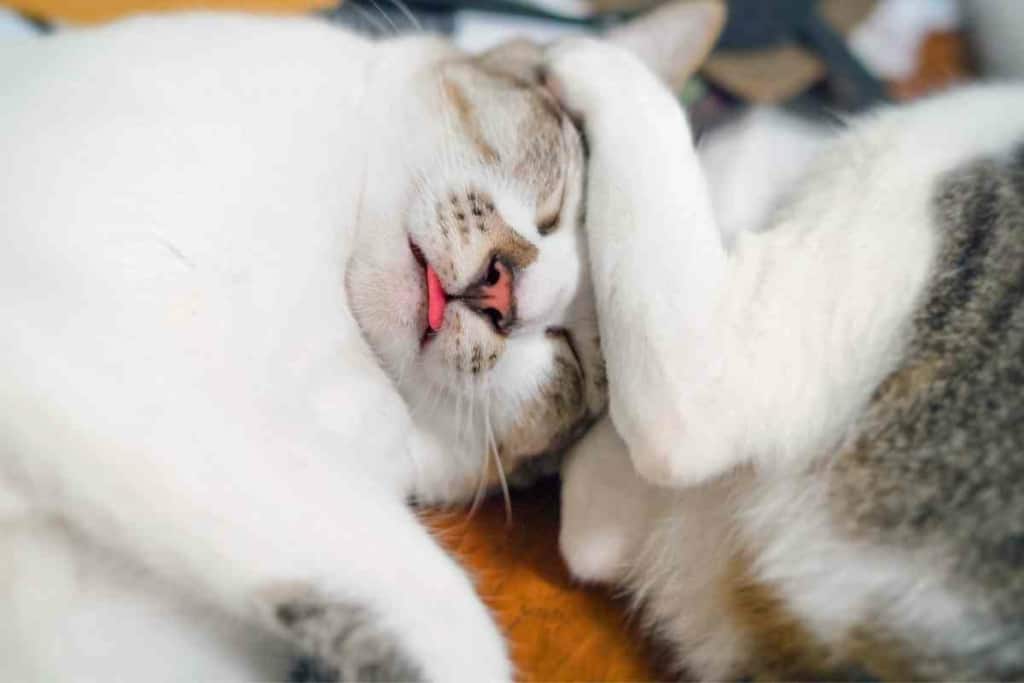
Dental Issues
If your cat has dental concerns, your cat’s lips could be swollen. Infected teeth and gums can cause inflammation that extends to the tissue under your cat’s lip, causing their lips to look swollen.
A dental abscess at the swelling site or other dental problemscan cause swelling. Left untreated, a minor injury or oral problems can cause physical manifestations in the lip and chin area as well as in the mouth.
You can easily look inside your cat’s mouth to see if their gums are red and inflamed. Some dental concerns cause a cat’s teeth to grow at abnormal angles, and they may even have a tooth that is poking them in the lip.
Your vet can help clean your cat’s teeth and start them on antibiotics to help with any dental infection that your cat may have. Some, like tooth resorption or lip inflammation as a result of dental disease can be very painful, so seek out help for ideal pet health.
Allergies
Allergies commonly will cause a cat’s lips to be swollen. They may have injured their face, pawing at it because it itches from the allergies. Many cats experience allergies, and it can be very detrimental to their well being. The most common causes of allergies are environmental and food allergies. Various things can cause swelling.
They may even have gotten stung by a bee or other insect in their face causing their lip to swell.
Allergies are not the most common cause of lip swelling in cats but can happen. Your vet can prescribe anti-inflammatory and allergy medication for your cat to help decrease this swelling.
Bug Bites
If your cat spends a lot of time outside, they may have gotten bitten by a bug. Mite infestation is a common cause for hair loss and small scabs as well. Cati mites, gatoie mites, demodex gatoi, and others can cause issues. Bees, snakes, and other bugs are very intriguing to most cats. They will commonly chase after these insects and get bit or stung in their face.
This would cause your cat’s face to become swollen. Many times, this type of swelling will quickly get better with just some antihistamines such as Benadryl. Even an attached insect may fall off the cat’s body with treatment, but you may need to remove it.
You can give your cat Benadryl if you think that they got stung in the face. The typical dosage used for cats is 1mg per pound twice a day. This is essentially ½ adult Benadryl tablet twice a day.
Trauma
If your cat is known for getting into things they should not have, they may have fallen and hit their face on the floor.
While most cats do land very easily on their feet, some will get caught in something on the way down, causing them to hit their face. This can cause their lip to be swollen and even cause their face to bleed.
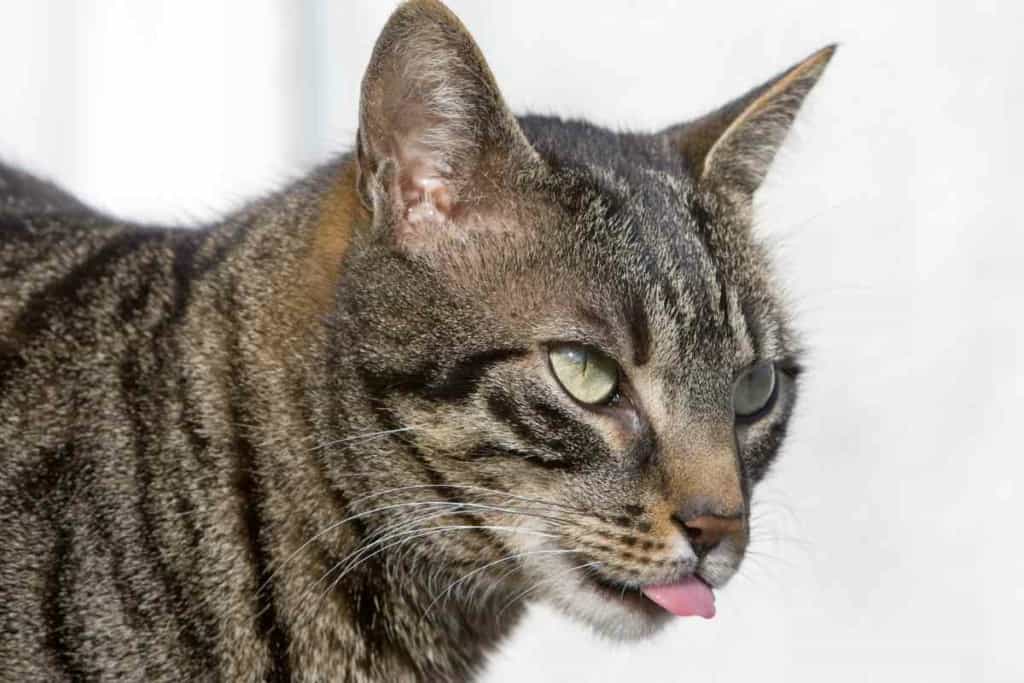
What To do to help my cat with lip swelling
If your cat’s swollen lip is persistent, it is best not to ignore this as it could be the beginning signs or something more severe. These are a few things that you can try at home to help.
Wash your cat’s face
At home, you can try to keep this area clean by washing your cat’s face. Using baby shampoo mixed ½ shampoo, and ½ water will help keep your cat’s face clean without you having to give them a full bath.
After using the soap/water mix, you can just wipe the soap off with a washcloth with just water.
Change Bowl types
Sometimes it is the bowl that is causing your cat’s swollen lips. If you are using plastic food bowls, try switching to a metal, glass, or ceramic bowl. if you got new cat food, go back to the old brand for a while.
Also, make sure that you are cleaning your cat’s bowl every day. Bacteria and other allergens can quickly build up on your cat’s bowl, causing tooth rot or swelling.
Feed a Hypoallergenic diet
Some cats’ do have food allergies, and this may cause a swollen or fat lip. If problems in the cat’s mouth area continues, you can try feeding a hypoallergenic diet or a limited ingredient diet. Allergic reactions are less likley to affect cats
Many of these can be found at your local pet store. Some will need a prescription from your vet.
See your vet
If your cat’s lip is very swollen and ulcerated, your cat will need to see your vet. They can examine your cat to see why their lip is swollen.
They may need to take small samples of this area to look for cancer or do other diagnostic tests. Your vet will be able to prescribe your cat antibiotics and anti-inflammatory medications.
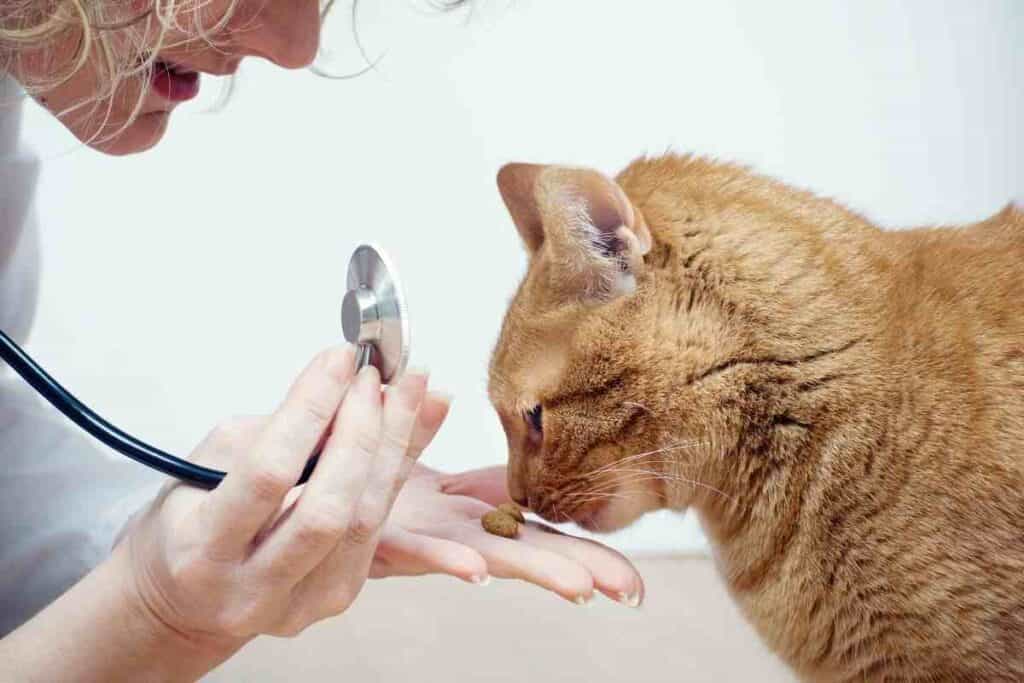
Final Thoughts
Your cat’s swollen lip may easily go right back down after a few days. There are many reasons for this swollen lip.
Many are not very serious. If your cat’s lip looks infected or is quickly getting worse, it would be best for your vet to see your vet.
They can assess what is causing your cat’s lip to be swollen and get them started on medication to help right away.
Related Articles Just For You!
If you found this article about a cat’s swollen lip helpful, I suggest checking out one of these other articles.
- Swollen lips in cats can be caused by a variety of reasons.
- Some common causes include Eosinophilic Granuloma , cancer, chin acne, dental problems, allergies, bug bites, and trauma.
- Eosinophilic Granuloma can be treated with flea and tick prevention, limited ingredient diets, antibiotics, and anti-inflammatories.
- Cancer on the face or lips of cats may require chemotherapy or radiation treatment.
- Chin acne can be treated by washing the affected area with a gentle shampoo and switching to glass or ceramic food bowls.
- Infected teeth and gums can cause swollen lips, and treatment may include dental cleaning and antibiotics.
- Allergies may cause lip swelling, and anti-inflammatory and allergy medications can be prescribed.
- Bug bites can be treated with antihistamines, such as Benadryl, and the typical dosage is 1mg per pound twice a day.
- Trauma may also cause lip swelling, and treatment depends on the severity of the injury.
- If a cat’s lip does not improve quickly, it is recommended to seek veterinary care.

